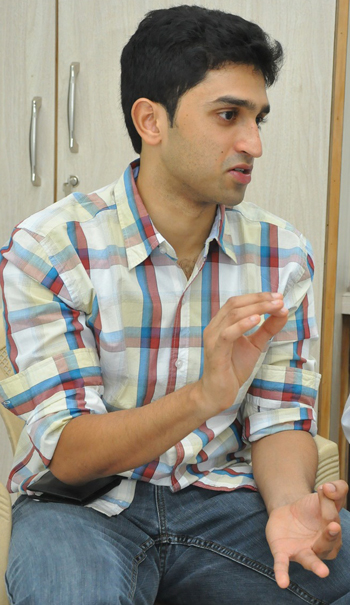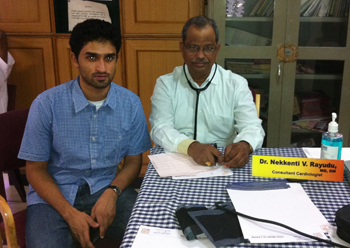Rice senior Sevith Rao founded the Indian Heart Association to target the cardiac disease epidemic among South Asians.
Heart disease is the leading cause of death worldwide, and recent reports suggest that South Asians account for nearly 60 percent of the world’s heart-disease burden even though they make up less than 20 percent of the global population.
Rice University senior Sevith Rao believes that statistic is far too high. He has been committed to seeing it plummet – even before he graduates from Rice next month. Working with his brother, Dr. Sishir Rao, a Rice and Baylor College of Medicine alum, Sevith founded the Indian Heart Association (IHA) to raise awareness about preventive cardiac health and to lower heart-disease rates among the population in South Asia. The organization conducts cardiac screening camps and partners with local physicians to improve cardiac screening in community health clinics.
“I am truly impressed by the passion that has been infused into the IHA over the past two years,” said Sishir, who is also a clinical fellow at Harvard Medical School and radiology resident at Massachusetts General Hospital. “I’m also awestruck by the organization’s growth while tackling the greatest health challenge facing South Asians today.”
Sevith, who is studying health sciences and policy studies and health care management at Rice, was inspired to form the organization after witnessing many close family and friends suffering from heart disease. Much of his family is from southern India, and he maintains strong ties to the country.
“What seemed like isolated instances of heart disease among family and friends appeared to be increasingly common among members of the South Asian community,” said Sevith, who has authored numerous peer-reviewed medical publications and has a keen interest in global health.
After finishing his double-major requirements at Rice in three years, Sevith has worked with the IHA full time for the past two years. Sevith has overseen the organization’s free cardiac screening camps and built relationships with physicians, nonprofits, consulting firms, hospitals and the Indian government.
“I’ve worked with several political powerhouses, including members of the Indian Parliament and Legislative Assembly, Speaker of the Legislature and a U.S. National Medal of Science awardee,” Sevith said. “The Indian bureaucratic system is a true labyrinth, and these individuals have gone out of their way to help me navigate India’s complicated political system.”
Sevith said the IHA is putting together an informative presentation on cardiovascular disease for Indian Cabinet members for later this spring.
Shortly after the organization was founded, the Bureau of Indian Standards (BIS, an Indian agency similar to the U.S. Food and Drug Administration) reached out to Sevith and asked the IHA to join its organization through a federal health committee.
“In this new role, IHA representatives are traveling to New Delhi and helping to shape national public health policy,” Sevith said. “True giants in the health arena, including Apollo Hospitals (the third-largest private hospital network in the world) and national governmental ministries are part of the BIS, and it has been an absolute honor to be affiliated with the organization.”
Sevith said his decision to spend time away from Rice to immerse himself in nonprofit work abroad and devote himself to the IHA was a tough one that took a lot of thought and introspection, but ultimately he is glad to have made a positive difference to the cause he so strongly believes in. He attributes his success with laying the framework for the IHA to the myriad and outstanding opportunities available at Rice.
“Both the health sciences and policy studies – health care management programs complemented each other very well,” Sevith said. “The health sciences curriculum, which is similar to a public health degree, enabled me to examine health promotion and education from a multifaceted angle and understand the mechanisms that affect community health.” Sevith said that the IHA initiatives were structured after the successful health programs that he studied in the health sciences major.
He also noted that Rice’s policy studies — health care management program helped him understand government relations at the global level. “Specifically, Dr. (Don) Ostdiek’s classes gave me the knowledge base to maneuver through India’s convoluted bureaucracy,” he said.
Sevith said the hallmark of his Rice global health experience was the mentorship of Nicholas Iammarino, director of the Health Sciences Program and chairman of Rice’s Department of Kinesiology.
“Dr. Iammarino not only guided me in successfully executing several IHA programs, but also helped me grow as a human being throughout my time at Rice,” Sevith said. “The diverse experiences and relationships that I have formed with the wonderful students, faculty and staff at Rice are memories that I will cherish for the rest of my life.”
“Sevith and his older brother, Sishir, were real standouts as health science majors at Rice,” Iammarino said. “It is I that am inspired by students like Sevith who challenge the norm and push the envelope to do what is uncommon and unconventional. He will surely become one of the leaders that will help shape medicine and health policy.”
During his time at Rice, Sevith offered a student-taught course on cardiovascular disease prevention, incorporating many elements of what he learned from his undergraduate degree curriculum and real-life lessons from the IHA. He is also the 2014 recipient of the Department of Kinesiology’s Gilbert L. Hermance Award. The award represents the highest distinction among graduating seniors in the Health Sciences program, and recognizes seniors who have exhibited exemplary qualities of scholarship, leadership, character and service during their undergraduate experience.
Sevith will attend medical school in the fall. While he’s uncertain which area of medicine he will pursue during his residency, he plans to continue combating heart disease.
“There is still so much work to be done, but there is a great potential for success in lowering heart disease among South Asians,” Sevith said.
For more information on the IHA, visit http://indianheartassociation.org/.






This is truly inspiring work. Kudos to Sevith and the Indian Heart Association for raising awareness about an important health issue.